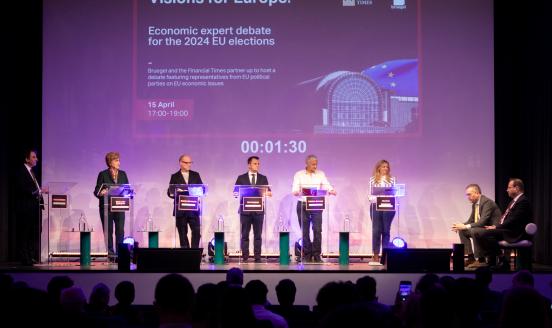Reactions on the German Coalition Treaty
More than two months after the Federal elections, Merkel’s CDU came to an agreement to form a coalition government with the Social Democrats
More than two months after the Federal elections, Merkel’s CDU came to an agreement to form a coalition government with the Social Democrats (SPD). A debate about the coalition treaty has emerged as some issues remain controversial such as the introduction of a nationwide minimum wage, new benefits in pension policy, new excess spending and measures addressing the challenge of the German energy turnaround. We want to review the commentary on the agreement, in particular by business representatives, economists and German media voices.
Recent polls show that 52 percent of German citizens are satisfied with the outcome of the coalition negotiations and that 78 percent of SPD voters are in favour of the treaty.
German trade unions consider the coalition treaty as a success. The Confederation of German Trade Unions (DGB) welcomes the coalition treaty , in particular the introduction of a minimum wage, the early retirement with 63 years and the introduction of rent controls. Overall, “despite some weaknesses, the coalition treaty goes in the right direction. Germany is becoming more equitable”. The IG Metall (Industrial Union of Metal Workers) praises the plans of the coalition for labour market and pension. Head of IG Detlef Wenzel told Reuters on that “It is important for us that the interest of employees plays again an important role”.
However, the treaty is very controversial in the German business world and among economists. According to Deutsche Bank research, “the treaty reflects the need to compromise instead of providing an ambitious agenda for Germany to address the upcoming economic and political challenges”. “The agreement reverses some of the previous successful reforms in the labour market and the social security system via give-aways in the pension system and by introducing a nation-wide minimum wage”.
The president of the Federation of German Industries (BDI) Ulrich Grillo says the document is “a lost chance for the future of Germany.” “This agreement doesn’t pave the way for higher growth and more employment, but subjects business to a new stress test and will hurt Germany’s attractiveness as industrial location”.
Eric Schweitzer, president of the Association of German Chambers of Industry and Commerce (DIHK) notes the absence of tax hikes as a positive element in the treaty, however, “there is a lack of will to initiate further reforms, for example in the tax system”.
Lars Feld, member of the German Council of Economic Experts says that the agreement will show its negative impact “at the latest during the next recession”. The treaty makes labour expensive and that will cost jobs in an economic downturn. His biggest concern according to the Handelsblatt is that the consolidation of state finances is abandoned. “I only hope that the debt brake survives this grand coalition”.
Michael Hüther, director of of the IW (Cologne Institute for Economic Research) worries about Germany’s competitiveness: “The important tasks such as demographic change, the energy turnaround and the reorganisation of federal finances have not been addressed”. The only good message of the agreement is “the prospect of a government capable of acting”.
What are the most controversial topics in the coalition treaty?
A nationwide minimum wage of EUR 8.50 will be effective as of January 2015. Berenberg Bank Analyst Christian Schulz says it will be detrimental to the labour market and undermine German demands for labour market reforms in the crisis-hit Eurozone countries. “It will surely hit employment in the next downturn”, he told Reuters news agency. Christoph Schmidt, member of the German Council of Economic Experts states that “The more the minimum wage will be applied the more economic growth will slow down.” According to Deutsche Bank Research, the impact might even lead to a decline of the aggregate wage income by 2017 or 2018. On the contrary, Peter Bofinger, member of the German Council of Economic Experts says that the introduction of a minimum wage shows” the will of the parties to improve living conditions over the next four years”. However, Deutsche Welle writes that the measure may come in watered-down form. It will be introduced in 2015, but won’t come into full effect until 2017, thus potentially giving employers time to negotiate exceptions (e.g. regional differentiation).
The grand coalition plans new benefits in pension policy. The planned reduction of contributions to the pension system is canceled. The saved money will be used to finance higher pensions for mothers and early retirement with 63 years (after 45 years of contributions). Eric Schweitzer, president of the DIHK, told the Handelsblatt that this “undermines the pension at 67, puts pressure on young generations and ignores the demographic reality”. Clemens Fuest from the ZEW (Centre for European Economic Research) underlines that the combination of pension and labour market reforms will be a burden on future generations. Deutsche Bank Research writes that the reforms will weaken the sustainability of the pension system, worsen inter-generational distribution conflicts and make it more difficult to convince crisis countries in the € area to address structural reforms, in particular in pensions.
“This [agreements on pension system] makes labour expensive” says the Germany-expert at the OECD, Andres Fuentes to Reuters. “This will have a negative impact on business activity and employment”. The OECD criticizes in particular the early retirement scheme with 63 years: “Incentives to work at a higher age should be enhanced, not reduced”.
The coalition treaty foresees excess expenditures of EUR 23 billion over the next four years. “It is difficult to justify the new social spending plans of the treaty with the background of inter-generation fairness” says BdB (Association of German Banks) president Jürgen Fitschen. Marcel Fratzscher, president of the DIW (German Institute for Economic Research) criticizes the focus on distribution of the treaty and Dennis Snower, President of the Kiel Institute for the World Economy (IFW) says that the treaty is only distributing money instead of “creating fundamentals for sustainable growth and employment”. Moreover, Deutsche Bank Research questions the financial feasibility of the projects outlined in the treaty - The two parties agreed that no taxes must be increased to fund the projects. In addition, fresh borrowing should be reduced to zero by 2015.
The challenge of the German energy turnaround (Energiewende) has not been sufficiently addressed. Fritz Brickwedde, president of the German Renewable Energy Federation (BEE) says that the coalition is putting brakes on the Energiewende, especially by defining the cap for the share of renewables in total power generation at 40-45 percent by 2025. Moreover, the treaty foresees cuts to subsidies and more market-oriented rules for renewables. Plus, the “risks to German corporates’ competitiveness due to the management of the Energiewende have not been sufficiently addressed” (Deutsche Bank Research) resulting in continued increase in energy costs and threat to the competitiveness of the energy-intensive part of German industry. Utz Tillmann, head of the VCI (German Federation of Chemical industries) says that the treaty creates a high degree of uncertainty, which will result in reduced investments.
Spiegel Online reviews the treaty and concludes that the introduction of the minimum wage is a “surprising breakthrough” . This will trigger displeasure among eastern German CDU members as the comparative advantage of Eastern Germany (“cheap wages”) will fall away. According to Spiegel Online the pension reforms are based on the principle “make a wish”: the CDU/ CSU obtained the increased pensions for mothers and the SPD the early retirement at 63. However, estimations of the costs of these reforms are missing. In general, the treaty provides no clue about how to finance its outlined projects. ”Priority measures” (p.88 of the treaty) will cost alone EUR 23-30 billion. This contradicts Finance Minister’s Schäuble’s plans forecasting a surplus of EUR 15 billion by 2016/2017. Although promised by the CDU, the treaty contains no clear commitment against future tax increases.
The Welt writes on 29 November that the baby-boom generation will be the only one benefiting from the reforms in the pension system, all others are confronted with increases in pension fund contributions. Thomas Öchsner in the Süddeutsche Zeitung also says that the reforms in the pension system such as the increased pensions for mothers will put pressure on young generations. “CDU and SPD risk the future of the entire system for a pure clientele policy”.
Gabor Steingart writes in the Handelsblatt that the treaty reflects Merkel’s strategy which he describes as a “Momentum Strategy” (finance: use up and downs of the unstable market), a mix of finesse and opportunism. The only wisdom behind this strategy is that ‘the majority cannot be wrong’.
Kurt Kister comments in the Süddeutsche Zeitung on the upcoming SPD ballot. “Really important things such as Agenda 2010 or Merkel’s phasing out of nuclear energy were never outlined in a coalition treaty”. Thus, SPD members won’t vote on the content of the treaty but more on the acceptance of being (again) Merkel’s junior partner. The ballot is unavoidable because of party-intern reasons. A rejection of the treaty would be a disaster for the SPD, “Such a vote of no-confidence would be the political end for team around Gabriel, Steinmeier and Nahles”.
Volker Zastrow in the FAZ on December 1 calls the SPD ballot a risky but “clever manoeuvre”. Sigmar Gabriel, SPD Chairman aims at rendering the party more open and at obliging SPD members to take more responsibility.
Comments largely focus on domestic and not on EU policies. Europe has never been a strongly contested issue between the negotiating parties. The treaty stresses Germany’s responsibility in EU politics: “European Integration remains Germany’s most important task”. The government’s position on Banking Union is not much different from the last one. All parties said they were committed to a banking union. However, legal hurdles are mentioned as well as the need to change the German law in order to allow for a direct re-cap of banks via ESM. Moreover, economic coordination and budget supervision shall be strengthened further, bilateral reform contracts should be considered as an instrument to foster structural reforms and the parties agreed to push for the introduction of an EU –wide financial transaction tax.



